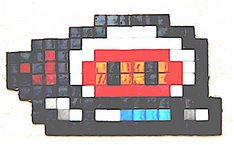The Economist: American society through the eyes of Tony Soprano.Saying goodbye to Tony Soprano

THE day of mourning is at hand. On June 10th, after eight years, 86 episodes and innumerable garrottings, gougings, beatings, decapitations and chain-assisted drownings, “The Sopranos” comes to an end, and with it arguably the best hour on American television.
Tabloid journalists are speculating about the final episode. Will Tony Soprano survive or splatter? Commentators are competing to heap praise on the series and its creator, David Chase. David Remnick uses his oracular position as editor of the New Yorker to pronounce it “the richest achievement in the history of television”. And others are grappling with the most pressing cultural questions of the day: what made the series so good? And what does it say about America?
There are lots of little things that made it so good. The sharp-eyed observation of dozens of different worlds, not just the mob-land of north-eastern New Jersey but also the smug little worlds of Columbia University, bohemian New York and psychiatrists' dinner parties. The extraordinary characters like “Paulie Walnuts” Gualtieri, with his weird wings of hair, who hover in the no-man's-land between cartoons and nightmares. The willingness to break with television conventions, not least the convention that everything has to be neatly tied up.
The most important reason, however, was the central conceit: that gangsters are human beings just like the rest of us. Mr Soprano is a mob boss who makes his living skimming city contracts, hijacking lorries full of booze and cigarettes, running illicit gambling. His office is in the backroom of a strip club, the Bada Bing; he enforces his business deals with beatings and murder. But Mr Soprano is also a regular McMansion-dwelling guy. His money never quite goes far enough. He worries about his children's upbringing. Above all, he has what Americans call “issues”. His mother was a monster, the black dog follows him wherever he goes and he sees a shrink.
It is hardly original for artists to try to blur the boundaries between the normal and the deviant. Hollywood has been in that game since at least the 1960s. But “The Sopranos” does it superlatively well. Mr Soprano's depression is rooted in family dynamics. True of many. But one of his earliest memories of those family dynamics is his father shooting a bullet through his mother's beehive hairdo.
The blurring of normal and abnormal is also the blurring of good and evil. Mr Chase makes no bones about the fact that his hero is evil. He carefully eschews the glamorising of gangster life characteristic of Quentin Tarantino and his ilk. Mr Soprano murders anybody who is a threat to him, including his nephew and his best friend, Sal “Big Pussy” Bonpensiero. He breaks bones with a stomach-turning crack. He commits adultery in a thoroughly animalistic manner, at one point with a one-legged Russian woman. Yet Mr Chase also portrays him as a devoted family man. “I'm a good guy, basically,” he tells his psychiatrist, not long after he has murdered a close relation. The result is complicated. Viewers hope for Mr Soprano's redemption. They also—let's be honest—take guilty pleasure in his freedom from middle-class hang-ups. In Tony Soprano Mr Chase reveals the banality of evil and its glamour.
Which leads on to the second question. “The Sopranos” says a lot of positive things about America—that it can pour out remarkably gripping and innovative drama and can elevate pop culture to the level of art. But it also says something worrying: that American culture is always likely to set people's teeth on edge, particularly in the world's more conservative corners; not just because it is so full of animal spirits, but also because it revels in overturning moral certitudes.
Love is hate
Foreign-policy commentators like to draw a distinction between soft power and hard power. The argument is that America has more to gain by spreading its ideas and values than through exercising its military muscles. They also often seek to make a clear distinction between pro- and anti-Americanism. But a little time with Tony, Big Pussy and Paulie Walnuts shows that things are a little bit more complicated.
Many people mistrust America not so much because they have not been wooed by its soft power but because they believe that they and their children are over-entangled in it. And many people are up in arms not simply because they are anti-American but because they are bipolar about America—simultaneously attracted and repulsed by what they see going on in the Bada Bing.
This is not to endorse Dinesh D'Souza, a writer who calls for an alliance between American conservatives and Islamists against Western liberalism. The cultural excesses of liberalism are a small price to pay for its benefits. And, besides, Sayyid Qutb, the intellectual godfather of al-Qaeda, fashioned his hatred of America while watching church dances in rural Colorado. Still, it is one thing for Western sophisticates, with a life-time's immersion in pop culture, to watch Mr Soprano at work; quite another for people in more traditional places.
American culture has always had a weakness for sex and violence. But since the 1960s it has gleefully eliminated conventional distinctions between good and bad, and since the 1990s it has been supercharged by the dramatic increase in the power of mass communications that are bringing America's cultural offerings to every corner of the world. The success of “The Sopranos”, both commercially and critically, can only serve to reinforce this trend. The tensions created by the growing global reach of shows like “The Sopranos” may prove far more difficult to manage in the long run than the tensions created by the passing neoconservative moment.


